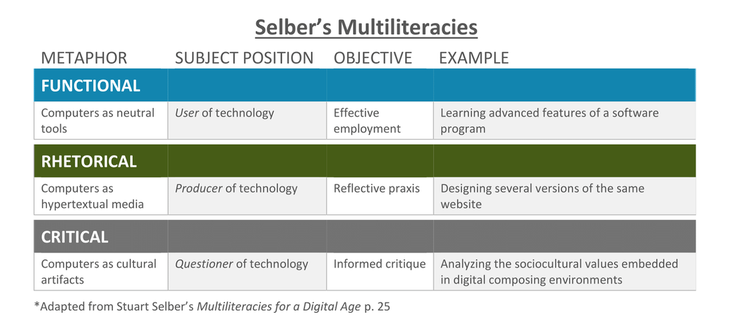Theory

Computers and composition scholars have regularly critiqued deterministic narratives of technology that construct them as either neutral tools or autonomous cultural forces (Duffelmeyer, 2000; Johnson-Eilola, 1997; Kimme Hea, 2002; Selfe, 1999; Turnley, 2011). Rejecting these narratives, scholars such as Andrew Feenberg (1991) have instead argued for a critical theory of technology. Feenberg’s critical theory of technology sees technology as an “ambivalent process,” where technology is not neutral but is not taking us over, either (pp. 14-15). In other words, in Feenberg’s view, human action can effect change in technological environments.
In Multiliteracies for a Digital Age, Stuart Selber (2004) drew on scholars such as Feenberg and Bryan Pfaffenberger to argue that English studies students in a digital age need to become critically literate digital citizens. In other words, instead of just learning how to functionally use a technology, students also need to be able to critically analyze it and approach it rhetorically. Many computers and composition researchers have used Selber’s multiliteracies—functional, critical, and rhetorical—to describe the literacies students need to communicate with and through new media, also extending the theories beyond Selber’s focus on the computer and the interface to a range of composing technologies (Ballentine, 2009; Coley, 2012; DeVoss, Eidman-Aaddahl & Hicks, 2010; Stewart, 2014).
This concept of multiliteracies has become somewhat of a commonplace in the computers and composition scholarship. Most scholars committed to digital writing, particularly, acknowledge that writing teachers need to "develop practices that attend to the wide range of functional, critical, and rhetorical [emphasis added] skills that digital writing demands," as the National Writing Project argued (2010), in conjunction with Danielle DeVoss, Elyse Eidman-Aadahl, and Troy Hicks (p. 13). Yet, while many in the field seem to accept these literacies as a given, we have not yet fully explored they ways in which these literacies are being instantiated programmatically in teacher training or curricular development.
For Selber, as shown in table 1, functional computer literacy employs the tool metaphor, in which computers are neutral tools for our uses. This approach masks the social and political dimensions of technology. Selber noted that while it is dangerous to view literacy “as a set of value-free skills,” functional literacy can be framed in a positive light if it's discussed in the service of English studies students being able to control technological resources and understand the ways communication activities are organized in online environments—in order to compete for work in a digital age and enact change (p. 27).
In Multiliteracies for a Digital Age, Stuart Selber (2004) drew on scholars such as Feenberg and Bryan Pfaffenberger to argue that English studies students in a digital age need to become critically literate digital citizens. In other words, instead of just learning how to functionally use a technology, students also need to be able to critically analyze it and approach it rhetorically. Many computers and composition researchers have used Selber’s multiliteracies—functional, critical, and rhetorical—to describe the literacies students need to communicate with and through new media, also extending the theories beyond Selber’s focus on the computer and the interface to a range of composing technologies (Ballentine, 2009; Coley, 2012; DeVoss, Eidman-Aaddahl & Hicks, 2010; Stewart, 2014).
This concept of multiliteracies has become somewhat of a commonplace in the computers and composition scholarship. Most scholars committed to digital writing, particularly, acknowledge that writing teachers need to "develop practices that attend to the wide range of functional, critical, and rhetorical [emphasis added] skills that digital writing demands," as the National Writing Project argued (2010), in conjunction with Danielle DeVoss, Elyse Eidman-Aadahl, and Troy Hicks (p. 13). Yet, while many in the field seem to accept these literacies as a given, we have not yet fully explored they ways in which these literacies are being instantiated programmatically in teacher training or curricular development.
For Selber, as shown in table 1, functional computer literacy employs the tool metaphor, in which computers are neutral tools for our uses. This approach masks the social and political dimensions of technology. Selber noted that while it is dangerous to view literacy “as a set of value-free skills,” functional literacy can be framed in a positive light if it's discussed in the service of English studies students being able to control technological resources and understand the ways communication activities are organized in online environments—in order to compete for work in a digital age and enact change (p. 27).
Table 1
Regarding critical digital literacy, Selber claimed that students should be encouraged to recognize and question the politics of computers. Critical digital literacy employs the metaphor of computers as cultural artifacts, which “encourages attention to the non-neutral dimensions of computers and their non-neutral contexts” (p. 86). Students might be encouraged to analyze online environments, software, or hardware programs, asking who profits, who is left behind, and what values are embedded in these environments.
Rhetorical literacy positions students as not just consumers but as producers in computer-based environments. According to Selber, students should recognize the persuasive dimensions of electronic environments and of their designs in these environments. This requires students to reflect on their designs and consider ways to act in the world through those designs. Selber claimed that the rhetorical approach is a combination of functional and critical approaches.
While Selber's book discusses highly technical courses, such as software documentation writing, and provides examples that are beyond the scope of many composition courses such as first-year writing, many scholars still adapt his theory as a loose framework for seeing computer literacy as multi-faceted and more than a technical skill.
Rhetorical literacy positions students as not just consumers but as producers in computer-based environments. According to Selber, students should recognize the persuasive dimensions of electronic environments and of their designs in these environments. This requires students to reflect on their designs and consider ways to act in the world through those designs. Selber claimed that the rhetorical approach is a combination of functional and critical approaches.
While Selber's book discusses highly technical courses, such as software documentation writing, and provides examples that are beyond the scope of many composition courses such as first-year writing, many scholars still adapt his theory as a loose framework for seeing computer literacy as multi-faceted and more than a technical skill.
While Selber's theory has become valued in the field, Toby Coley (2012) identified what he believes to be a gap in Selber’s framework, suggesting that ethical literacy should be the "fourth multiliteracy” (p. 13). Based on case studies and survey research, Coley argued that when writing teachers teach with digital media, they should teach students to understand the audience's values and beliefs; they should construct safe digital environments for students and give them choices for the digital tools they use; and they should emphasize academic integrity, teaching students how to properly cite and evaluate information found in digital sources. He also essentially argued that administrators are ethically obligated to engage students in Selber's multiliteracies, from functional skills to analyzing the social implications of digital texts.
While I use Selber’s multiliteracies as the theoretical framework through which I interpret how digital literacy is being instantiated and interpreted in writing programs, I also include ethical digital literacy as a fourth multiliteracy. While I find that some of the obligations discussed by Coley overlap with Selber’s other multiliteracies, Coley has provided a useful category that requires attention, allowing more consideration of the audience's values and academic integrity.
